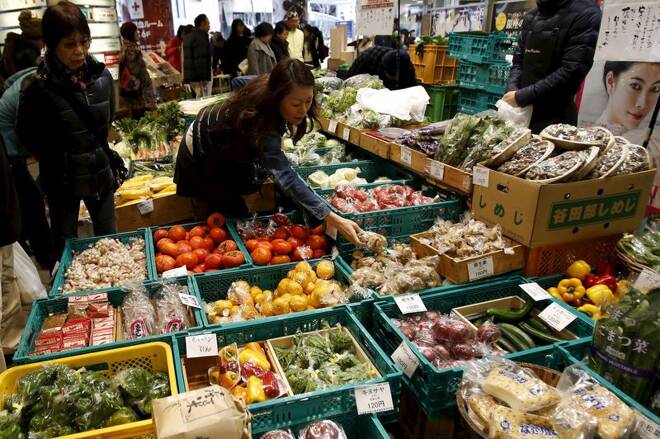Advertisement
Advertisement
Japan April consumer inflation beats BOJ target for 1st time in 7 years
By:
By Daniel Leussink TOKYO (Reuters) - Japan's core consumer inflation in April rose above the central bank's 2% target, hitting a more than seven-year high as increases in energy and commodity costs are causing broader price hikes that are pressuring households.
By Daniel Leussink
TOKYO (Reuters) – Japan’s core consumer inflation in April exceeded a central bank target of 2% for the first time in seven years, but only thanks to rising import costs, not the strong domestic demand that the central bank has been trying to kindle.
Still, the 2.1% rise in the core consumer price index (CPI) announced on Friday reinforces market scepticism that the Bank of Japan (BOJ) will maintain its ultra-loose monetary policy, especially since households are suffering rising costs without substantial wage growth.
The core CPI data excludes prices of volatile fresh food but not energy, which has galloped higher because of the war in Ukraine. So have costs of other commodities, which affect prices of non-fresh food, another driver of the lift in inflation.
Before April, the index had not risen so fast since 2015 or, excluding a mid-decade period affected by a hike in sales tax, not since 2008.
For years, inflation has generally struggled to reach even 1%, despite efforts by the BOJ to get it to 2.0%.
But analysts said that finally beating the target now was no great cause for celebration, because costs of foreign energy and other commodities had driven the upward shift.
“The current price rises stem from higher import costs. If you look at the overall situation, this means inflation is a burden on companies and households,” said Taro Saito, executive research fellow at NLI Research Institute.
“If wages rose, households could hope for higher real incomes, but they aren’t rising, so households are being impacted negatively.”
The BOJ set its 2% inflation target in 2013, during the first year of the tenure of its current governor, Haruhiko Kuroda. He has repeatedly said the central bank will be in no hurry to end its stimulus efforts, because any cost-push rise in inflation would be temporary.
So the central bank is keeping monetary policy extremely loose, looking for inflation holding stably at 2% and supported by strong wage growth. It is taking that stance even as other major central banks are tightening policy.
Sluggish wages
Japanese wages have barely budged relative to the cost of living since the 1990s and remain one of the most pressing problems for the world’s third-largest economy, fuelling households’ propensity to save rather than spend.
The latest wage data for March showed real wages shrank for the first time in three months as inflation outstripped a modest 1.0% year-on-year growth in total cash earnings.
The April inflation rate announced by the government matched the median forecast in a Reuters poll. It was much stronger than the 0.8% annual rise seen March, but that earlier figure was more strongly affected by a big drop in mobile phone fees that is fading out of the calculation.
Mobile phone fees pulled overall CPI down 0.38 percentage pointe in April, compared with 1.42 percentage points in March.
Strong rises in import costs meant money was flowing abroad, said Atsushi Takeda, chief economist at Itochu Economic Research Institute.
“There’s no mistake that it’s economically bad,” he said.
Inflation may now be high by Japanese standards, but it remains low compared with what is seen elsewhere, because Japanese firms cannot easily raise prices when wage growth is sluggish. U.S. consumer prices rose 8.3% in the 12 months to April.
In a sign cost-push inflation is likely to keep pressuring Japanese households, data due on May 27 is expected to show Tokyo-area consumer prices were 2.0% higher in May than a year earlier, according to a Reuters poll of 17 economists.
(Reporting by Daniel Leussink; Editing by Stephen Coates and Bradley Perrett)
About the Author
Reuterscontributor
Reuters, the news and media division of Thomson Reuters, is the world’s largest international multimedia news provider reaching more than one billion people every day. Reuters provides trusted business, financial, national, and international news to professionals via Thomson Reuters desktops, the world's media organizations, and directly to consumers at Reuters.com and via Reuters TV. Learn more about Thomson Reuters products:
Advertisement
